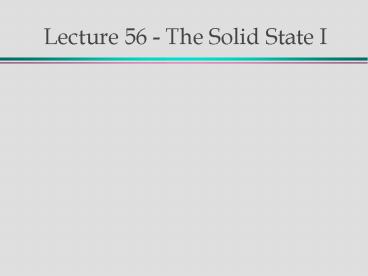Lecture 56 The Solid State I
1 / 35
Title:
Lecture 56 The Solid State I
Description:
repeats in x, y or z directions. The Crystal Lattice. The Unit Cell. The Crystal Lattice ... x 100 = 52% Coordination Number = 6 for simple cubic structures ... –
Number of Views:61
Avg rating:3.0/5.0
Title: Lecture 56 The Solid State I
1
Lecture 56 - The Solid State I
2
Look around...
- How many gases are you familiar with?
- Liquids?
- Solids?
- Most familiar objects are solids!
3
The Solid State
- - relatively hard
- - may be brittle
- - may conduct electricity or heat
- - particles close together
- - little relative movement of particles
4
Solids may be...
- crystalline - long range 3D order in arrangement
of particles - amorphous - random arrangement of particles
5
Particles in solids may be...
- 1. separate ions (Na, Cl-)
- 2. separate molecules (H2O, CO2)
- 3. covalently bound networks of atoms (C,
SiO2) or molecules - 4. metal atoms (Cu, Ag, Fe)
6
Intermolecular Forces in Solids
- Solid Force Properties
- Ionic ion-ion hard, brittle, high
Tm - Molecular dispersion, soft, low Tm,
- H-bond, non-conducting
- dipole-dipole
- Covalent covalent bonds hard, high Tm,
- network non-conducting
- Metallic metallic bonds conducting
7
X-ray Diffraction
x-rays in
to detector
q
d
d sin(q)
8
X-ray Diffraction
destructive interference
constructive interference
9
X-ray Diffraction
- constructive interference only when
nl
d
2 sin (q)
n an integer
(The Bragg equation)
10
The Unit Cell...
- the smallest repeating unit in a crystal
- repeats in x, y or z directions
11
The Crystal Lattice
The Unit Cell
12
The Crystal Lattice
or
13
The Unit Cell...
- the smallest repeating unit in a crystal
- repeats in x, y or z directions
- 14 known geometries
- 3 are cubic
14
The Cubic Crystal Lattice
Lattice Points (atoms, ions or molecules)
Unit Cell
15
Simple Cubic Lattices
simple cubic
8 x 1/8 1 atom/unit cell
16
Simple Cubic Lattices
unit cell volume (2r)3 8r3
r
space used 8 (1/8) (4/3pr3) 4/3pr3
space used
4/3pr3
x 100 52
8r3
17
Coordination Number
6 for simple cubic structures
18
for example,
- Po metal crystallizes in a simple cubic
structure, r 9.4 g/cm3 - Find
- 1. The radius of a Po atom
- 2. The length of the unit cell (d)
19
for example,
- Strategy
- 1. Find mass of one Po atom
- 2. Find volume of unit cell
- 3. Find r
- 4. Find length of unit cell
20
for example,
210.05 g/mol
1. mass
6.022 x 1023 atom/mol
3.49 x 10-22 g/atom
21
for example,
- 2. unit cell (8 x 1/8 atoms) 1 atom
22
for example,
- 2. unit cell (8 x 1/8 atoms) 1 atom
mass
unit cell volume
density
3.49 x 10-22 g/atom x 1 atom
9.4 g cm-3
3.71 x 10-23 cm3
23
for example,
- 3. unit cell volume 8r3
8r3 3.71 x 10-23 cm3
or, r 1.67 x 10-8 cm
1.67 x 10-10 m
167 x 10-12 m
167 pm
24
for example,
- 4. Unit cell length 2r
334 pm
25
Body Centred Cubic Lattices
(8 x 1/8) 1 2 atoms/unit cell
body centered cubic
26
Body Centred Cubic Lattices
- Coordination number 8
- Space used 68
27
for example,
- U crystallizes in a body centred cubic lattice
with an edge d 346 pm - Find the density of U
28
for example,
1. volume of unit cell d3
(3.46 x 10-8 cm)3
4.15 x 10-23 cm3
29
for example,
2. unit cell 2 atoms
mass of unit cell
238.0 g/mol
2 atoms x
6.02 x 1023 atoms/mol
7.90 x 10-22 g
30
for example,
mass
3. density
volume
7.90 x 10-22 g
4.15 x 10-23 cm3
19.04 g/cm3
31
Face Centred Cubic Lattices
8 x 1/8 6 x 1/2 4 atoms/unit cell
face centered cubic
32
Face Centred Cubic Lattices
- coordination number 12
- space used 74
33
Hexagonal Lattice
Top View
34
Hexagonal Lattice
- coordination number 12
- space used 74
35
Closest Packing...
- face centred cubic
- and hexagonal unit cells































